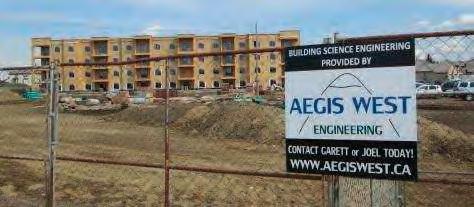
44 minute read
Education Station

#101, 1 Carswell Street St. Albert, AB T8N 7N5 Ph: (780) 756-4222 Toll Free: 855-879-1513 Fax: 1-855-287-2212 www.diverseclaims.ca
Diverse Claims Adjusters Ltd. proudly openedtheir doors in June 2009. Since the beginningwith three experienced staff, the company has grown while maintaining the focus on what is most important,customer service.
Withthe recent changes to the Condo Act as of January 1, 2020 our background and experience has allowed us to work with many Condo Corporationsto providea detailed and thorough Standard Insurable Unit Definition (SIUD). This includes working with more complex Corporationswith multiple layouts and unit configurations.
Our office also routinely helpsin providing Condo Corporationsreports to assist on any issues that may result in a conflict situation with a unit owner or owners. Our expertise in these eventshas provento diffusethesituationby offering our knowledgefrom an independent standpoint as opposed to allowing atenuoussituation to escalate. This is becoming more importantfor Corporations as thepremiums and deductibles continue to increase due to the present market.
With key staff specializing in the residential / commercial Condominium market forover 20 years, and the additionofexceptional adjusters who handle a wide variety of multiline propertyand casualtyclaims, the company has developed a loyal clientele. Insurers, Property Management Companies,and Condominium Boardsall know they can make their first call to Diverse, and we will handle the matter professionally, and in a timely fashion on a 24 hour a day basis, 7 days a week.
Toassist you with any of your claim handling needs, or if you like further informationon our SIUD program, please contact either:
Paul Whitman, FCIP Mike Eisbrenner, CIP 780-756-4222,Ext.221 780-756-4222,Ext. 237 paul@diverseclaims.ca meisbrenner@diverseclaims.ca



Meet the BOARD Cody Hodson
Cody Hodson is one of the owners of Off the Ledge, an Edmonton based window cleaning and building services company. Cody joined the Board of Directors of CCI North Alberta at our 2021 AGM. This interview has been edited for length.
You co-founded and operate a professional exterior maintenance service company specializing in window cleaning, eavestrough cleaning, and pressure cleaning. What is the most important thing for a condominium corporation to know?
With being a seasonal company, we have a very short period of time to schedule in as many jobs as possible. May and June are always the most desired months for condominiums corporations to schedule services since this is when street and parking lot sweeping is completed. By booking services two to three months in advance (February to March), or by signing up for a two to three year fi xed price agreement, this will help ensure we can schedule the requested service for the desired day or week (ideally right after the parking lot sweeping has been completed).
With owning a seasonal company focused around spring, summer, and fall, what do you do in the winter?
In my early 20s I pursued secondary education during the winter months and attained a Bachelor of Commerce Degree from the University of Alberta, along with a Personal Fitness Trainer Diploma from NAIT. I also did a fair bit of travelling and spent about 6 winters overseas chasing the sun. Once I hit my early 30s I decided to dedicate the winters to really focusing on Off The Ledge by developing client relations, strengthening our extensive safety program, and streamlining operations. I was also fortunate enough to become an elected board member for the CCI and have since dedicated my time and effort to this amazing organization.
How tall is the tallest building you’ve ever worked on? How do you deal with being that far off the ground?
I performed work on the Marriot Tower during its construction. This tower is 630 ft tall and was the 40th tallest tower in Canada in 2019. Honestly, I love heights and working off ropes. It’s a surreal experience being that high off the ground and I’m lucky because I really do get to experience some of the best views in the city. I think a lot of being comfortable at heights is trusting your equipment, skills, and knowledge. Every system we use has a back-up and all of our rope access technicians are IRATA trained and certifi ed. We are all capable of performing self-rescues and assisted-rescues so this really helps with peace of mind. Everyone always says “don’t look down” but hey, if you’re not looking down, you’re missing out on half of the experience!
Honestly, it would have to be my grandfather, my mom’s dad. He passed away before I was born so I never got the chance to meet him. From all the stories I heard about him, he was quite the character.
What is the best advice you’ve ever received?
Go travelling. During university I ended up taking a semester off to go travelling. After a couple months of making my way down from the UK to Morocco, I was hooked. I immediately signed up for the exchange program at the University of Alberta and spent the next year living abroad in Wales. From then on, my life has never been the same. I believe travelling is one of the best things a young adult can do. It’s eye opening to see the world from a different perspective, to experience different cultures, different ways of life, and to force yourself outside of your comfort zone. As you get older travelling so openly becomes harder and harder and I’m incredibly grateful I had the opportunity to explore the world and have some crazy experiences.


Meet the BOARD Hamish Farmer
Hamish Farmer is a Vice-President, Client Executive – Real Estate Division with BFL Canada. He joined the board of CCI North Alberta at our 2021 AGM.. This interview has been edited for length.
What got you into a career in insurance?
A friend loved his job as an insurance broker and after university I made a career switch.
We understand you’re an avid golfer. What do you like about the game?
You’re outside, it’s social and I’ll never master it.
What sets the condo insurance market apart from other kinds of residential real estate insurance?
The Act, the Act, the Act!. It’s fascinating that the government is so involved…
What was your fi rst job?
Busperson in a restaurant. Everyone should work in the hospitality industry for at least one job.
If you didn’t have to sleep, what would you do with the extra time?
Run and ride my bike more.
Dogs or cats?
Dogs.
Nelson Mandela
What advice would you give your younger self?
It’s going to be ok.

Amanda Hrycun
Senior Executive Property Manager, Associate/Condominium Associate Broker
Maint. Emergency Line After Hours 780.499.8424 #203, 13455 - 114 Avenue NW Edmonton, AB Canada T5M 2E2 Ph. 780.448.4984 ext. 352 Direct. 587.525.9736 Fax. 780.448.7297 amanda@ayreoxford.com


Government advocacy report




Dear Members,
We have a number of updates on the government advocacy front. The Condominium Property Act is once again in front of the Legislature for amendment and there are a number of other regulatory and legislative changes in the works that will impact condominiums.
B BILL 19
The first few months of 2022 were very busy as we worked with the provincial government to develop amendments to the Condominium Property Act to address some concerns that CCI North Alberta and other stakeholders have raised. After extensive and productive consultations with stakeholders, the Government of Alberta introduced a series of amendments to the Condominium Property Act including: • Streamlining the requirements for voting which will improve owners’ ability to participate in the governance of their condominiums and will help keep administrative costs down. • Clarifications on chargebacks to ensure the legislation works as intended when it comes to accountability for unexpected costs or damages in condominiums • New clarity on the requirements for assessments of converted buildings • Other changes meant to streamline the Act and improve clarity CCI North Alberta along with other condominium stakeholders have been advocating for these changes for several years, especially the amendments that will, if passed, streamline voting and clarify the requirements for chargebacks. We also continue our advocacy for a mechanism to protect Owners from reckless claims of chargebacks. While we were very pleased to see the government respond to our advocacy efforts by bringing these changes forward, we are disappointed that Bill 19 did not pass before the legislature wrapped up the spring sitting. We now have to wait until the fall sitting to see if Bill 19 passes when the legislature resumes. The fall sitting is currently scheduled to begin on October 31, 2022. Nothing changes for condominiums while we wait. The Condominium Property Act as it existed before Bill 19 was introduced continues to be in force. We will be meeting with Service Alberta this summer to participate in developing the regulations so that, should Bill 19 pass, we can move quickly towards having it proclaimed. We will also be advocating to the provincial government on the need to press forward with the long-awaited condominium dispute resolution tribunal.
CO ONDOM MI INIUM MANAGER LICENSING G AN A D REC CA
CCI’s efforts on condominium management licensing rollout have been focused on our work as a member of the Alberta Condominium Management Education Consortium (ACMEC) to ensure that condominium managers have timely access to prelicensing education. We have also been gathering input on how condominium management licensing is unfolding. We continue to hear concerns from our members about the rollout of licensing in a number of areas. We will be requesting meetings with RECA to discuss these issues. Of particular concern are the concern that the competency framework for condominium management does not adequately reflect the practical reality of the condominium management profession, and concerns about the connection between pre-licensing exams and expertise in condominium management. We are concerned that these issues could negatively impact not only condominium managers, but access to condominium management services for condominium corporations. RECA is in the process of updating their strategic plan and consulting with stakeholders. We have provided input throughout their consultation process. Overall the shifts that RECA is exploring in its strategic focus are promising. We are advocating for explicit recognition of the diversity of real estate and property management professions including condominium management and for a strong focus on the unique needs of consumers when they are interacting with condominium managers.
PR ROMPT PAYMENT LEGISLATION IS CO OMING
The new Builder’s Lien (Prompt Payment) Amendment Act will be coming into force and be renamed the Prompt Payment and Construction Lien Act (PPCLA). The new legislation comes into force on August 29, 2022. This legislation will have a significant impact on condominium construction and restoration projects.
Government Advocacy Committee member Amber Nickel has been hard at work behind the scenes on this initiative since well before the legislation was introduced. She participated in consultations on behalf of CCI North Alberta. Check out her latest update in this issue.
N NEW HOM ME BUYER PROTECTION LEGISLATION
Municipal Affairs is undertaking a review of the New Home Buyer legislation. CCI North Alberta attended a stakeholder session in late June and provided input to help ensure that condominium perspectives are represented. Our position is that Owners paid for a new condominium and paid to have it built correctly from the outset. We are advocating for greater consideration of multi-family concerns within warranty coverage. The concerns affect townhouse, apartment, duplex and other styles of condominium. Our feedback included: • Identifying that it is condominium owners who bear the financial and other consequences if there are defects which are not covered under the policy, or if the developer fails to complete the work. • Pressure on developers to finish all work related to the development to avoid incomplete work can be used as an exclusion to warranty coverage. • Supporting publication of reporting details on number of claims made, nature of the claims made and developer names.
This will assist consumers in identifying developers who are struggling to provide We deliver homes free of defects • Request to modernize the Construction uncompromising
Performance Guide published by the government for warranty claims and performance.support the creation of a condominium specific Construction Performance Guide • Supporting requests for a more clear process to resolve disputes, including a We are Entuitive. roster of potential umpires with training and expertise in multi-family sites • Request to revisit the start date of when a common property warranty begins. The BUILDING ENVELOPE | STRUCTURAL ENGINEERING warranty on common property begins at BUILDING RESTORATION | SPECIAL PROJECTS | FIRE ENGINEERING the first arm’s length sale in a phase or building. There are circumstances where the 1 year common property warranty PEDESTRIAN MODELLING | WOOD DESIGN SERVICES ADVANCED PERFORMANCE ANALYSIS | BRIDGE ENGINEERING has expired before some purchasers have TRANSPORTATION STRUCTURES | CONSTRUCTION ENGINEERING even purchased their unit We will provide additional feedback to the government this summer to help protect Owners and Corporations as we try to effect entuitive.com change for condominiums in the New Home VANCOUVER | CALGARY | EDMONTON | TORONTO | NEW YORK | LONDON | EDINBURGH Warranty regimes. Once again thank you to our volunteer committee of condominium lawyers, Victoria Archer (Gledhill Larocque), Amber Nickel (Willis Law), Todd Shipley (Reynolds Mirth Richards & Farmer), as well as Dawn Mitchell with HUB International and Jeremy Dalgliesh with Converge Condo Management for their ongoing work and dedication. We would like to thank everyone who burned the midnight oil on Bill 19 - our team dedicated many hours to consultations in the lead up to the legislation’s introduction. We would like to thank Victoria Archer in particular for the many hours she spent working on Bill 19 with Hugh on top of all of the other invaluable contributions she makes to our chapter and the condominium community as a whole.
Anand Sharma & Hugh Willis Co-Chairs – Government Advocacy Committee

The Long and Winding Road:

Advocacy for Alberta’s Condominium Community
by Anand Sharma and Amanda Henry CCI North Alberta
Anand is President of CCI North Alberta and the Co-Chair of the Government Advocacy Committee. Amanda is the Executive Director of CCI North Alberta.

Change isn’t easy, and nowhere is that more true than when amending legislation and regulations.
But it’s critically important that legislation keep pace with the needs of the people it serves, which is why advocacy is a critically important part of the work that CCI chapters do across Canada for the condominium community. It has been a very busy few years in Alberta’s condominium landscape, and it is showing no signs of slowing any time soon. CCI North Alberta is committed to continuing to advocate for our members and share some tips that will hopefully help you as condominium owners.
WHY ADVOCACY MATTERS
Condominiums have their own legislation which is distinct from other kinds of housing. People who do not have experience living condo life or serving on a condo board don’t always have a good handle on the unique nature of how condominiums are regulated and how that affects condo life. As a stakeholder organization, we help to raise the condo IQ of both our members and members of the public, including elected officials and policy decision makers. In Alberta, we have seen a lot of changes to condominium legislation in the past 5 years. We have seen the introduction of a number of measures meant to address insurance pressure in the condominium market including Standard Insurable Unit Descriptions (SIUDs), deductible chargebacks and Best Terms Pricing. Considering the pandemic, condominium corporations were given additional responsibilities around holding virtual, telephonic, and hybrid AGMs. It is important for condominium stakeholders like CCI to be at the table when legislation is being amended. Our members have lived experience, industry expertise, and legal insights that are specialized in condominium. Our chapter has historically been quite active in this area. In the late 1990s we participated in the 2000 revision of the Condominium Property Act. This was a significant modernization of the Act and had big implications for condominium owners, corporations, and service providers. In 2013 the provincial government opened the Act again, with significant changes that were not overly helpful in addressing complex issues like chargebacks, voting, and clarity around reserve fund studies. CCI North Alberta took a strong stance against the introduction of Bill 9, Condominium Property Amendment Act, that was viewed as problematic by condominium community members. We worked with the Wildrose and NDP opposition to propose 14 amendments to it. One amendment actually was approved on the floor of the Legislature, a rarity in Alberta politics. CCI North Alberta was front and center in the opposition to the Act changes, including the lead story on most major news networks. This was a victory for condominium dwellers but strained the chapter’s relationship with the governing Progressive Conservative Party. It was an important lesson for us as a chapter - while going to bat to get amendments introduced was important given the many problems with the proposed legislation, it would have been helpful for us to be consulted well before any changes even made it to the Legislature for debate. In 2015, a new provincial government was elected and CCI North Alberta decided to focus on working proactively with the government to deepen their understanding of the unique issues that affect the condominium community. The legislation and regulations both saw significant revision under the NDP government - the biggest change we had seen in condominium legislation in almost 20 years. We were very active in working with the provincial government and engaging our members to make sure we were heard. We ran a postcard campaign urging the government to make amendments that ensured accountability for condominium chargebacks.
That campaign was successful in getting the government to pay attention to the issue, largely thanks to the huge participation of CCI North Alberta members. It took a couple more tries to get the legislation right, but we did successfully get the government to focus on how important this issue is.
In 2019, Alberta again elected a new provincial government. One of the first things the UCP government did was pause some of the changes the NDP had proposed to condominium regulations and start a new round of public consultation. CCI North Alberta was again at the table to keep the perspective of our members front and center for government. Our efforts alongside direct advocacy from condo owners helped get some changes to the proposed regulations that would save time and money for both condominium owners and corporations, such as changes to AGM notice and package requirements. During this whole period, we were also working on another big project: the path to condominium management licensing. We are now at the implementation stage of licensing, and if anything, the advocacy work has become more complex as we see how licensing is unfolding and what the condominium community needs the Real Estate Council of Alberta (RECA) to focus on to ensure this process is successful. CCI North Alberta’s advocacy is non-partisan. We do not ally with any political party, but instead work to build respectful, productive relationships with elected officials of all political stripes. We also work to build bridges and relationships with staff in the civil service and at the regulator responsible for condominium management to ensure that we can bring the concerns of our members forward.

HOW DOES ADVOCACY WORK?
1) Research
When working with the government to push for a change in their perspective, it’s crucial to be well-researched. For our chapter, that means we need a group of experts to lean on to help formulate positions and have a researched and well thought out position. When it comes to condominium, this involves everything from understanding the Condominium Property Act and relevant case law to building operations to insurance issues to board and owner perspectives. Gathering this information involves a lot of hard work and leaning into established relationships in the industry. Being a national organization is a significant advantage for us when it comes to research as it means we have access to cross jurisdictional information and insights and advice from other provinces. We share updates with our members through this magazine, through our document library, and on social media, both to keep you up to date on our work and to help with your own research and knowledge. We also invest a lot of energy into research on what our own members think. We gather this input through surveys, conversations, events, and again by leaning into relationships in the community. For example, to support and inform our advocacy on insurance, we • Established a working group with representatives from both Alberta chapters of CCI, other condominium associations, and from insurance experts, lawyers, owners, board members, and managers. • Surveyed Alberta condominium corporations - twice - about trends and issues they were seeing in insurance • Hosted a series of virtual town halls in 2021 to share what we were hearing and ask for more input on what needs to change • Investigated insurance issues and policy solutions in other
Canadian jurisdictions



2) Relationships
Being able to get the right voices and information to inform our perspective is only half the battle. You also need decision makers who will listen when it comes time to tell them where you stand and what you would like them to do about it. We build relationships with decision makers in a number of ways, but what it boils down to is making time for a lot of conversations and meetings and making sure elected officials and staff don’t feel like they only see us when there is a problem. We work to maintain open, two-way communication. We also try to find ways to help them solve problems from their end. We have a lot of issues we want them to address, but it helps us be seen as a valuable partner when we can step up and assist as well. We also build relationships with other condominium stakeholder organizations. There is strength in numbers, and in having a unified voice. CCI North Alberta and CCI South Alberta work closely together on advocacy priorities, often taking the time to put together joint submissions to the government and to the regulator that now licenses condominium management. Collaboration of this nature also takes time. We have to be able to engage in dialogue and come to consensus on complex and sometimes contentious issues. This is particularly true in an organization like CCI, where we have the perspectives of owners, boards, managers, lawyers, and other businesses and industry stakeholders that support condominiums at the table. This is as true in condominium corporations as it is when you are working with the government. Having productive relationships with other owners, board members, and between members of the board makes it easier to work together to solve problems.
3) Responsive
It is critical to be ready and responsive to media and government inquiries on a myriad of issues and develop quick messaging to get into news cycles and assist the government formulate their own position. Being responsive helps to forge those quick connections, which builds partnerships be it with the media or the government. This involves a really big investment of time, as well clear lines of communication inside of the chapter. Volunteers on the government advocacy committee often have to make time on short notice to come to a decision on big issues: things like our feedback on what an Alberta condo dispute resolution tribunal should look like for example.
4) Celebrating your Wins (without giving up momentum)
Advocacy is a slow march to progress, with a lot of effort and curves on the way to success. When we achieve something, even if it’s only part of the puzzle, it’s important to take some time to celebrate and share our good news back to our members. For example, we are very pleased to see the changes in Bill 19 that clarify voting and chargebacks, but we still have more work to do to get the provincial government to implement an effective condominium dispute resolution tribunal. Celebrating success can take many forms - a press release, emailed thank yous, sometimes a gathering to toast the hard-working individuals who built research papers and attended meetings behind the scenes. Seeing the impact of this work helps us stay motivated to keep building our capacity and relationships.

780 413-1655

Yes - we have the solution
Helping condominium boards find solutions to complex HVAC problems is something I love to do.
Keven Lackey
CVI - A.S.C.S. Converting old Magic-Paks with new efficient, cooling and heating systems is something we specialize in. Best of all, our solutions will not alter the outdoor aesthetic of the building. I’d love to help! 780 699-8592
WAYS TO SUPPORT ADVOCACY
None of this advocacy can happen without the support and active engagement of members of the condominium community. • Become a member of CCI North Alberta. There is strength in numbers. Having a large membership helps us make our case to the government. It also helps us engage you on the issues that matter through surveys. Our new membership year has a July 1 start, don’t forget to renew! • Let us know what you think. There is a members only
Facebook group where CCI North Alberta members can get advice and share perspectives with other members, as well as share thoughts on what you’d like to see. We also put out surveys and other engagement opportunities. • Write to your elected representative. The tips we have shared above about research in particular will help if you are writing directly to an MLA, City Councilor or Reeve, or other elected officials. Elected officials get a lot of correspondence and are not necessarily experts in every issue, so showing them that you are informed and passionate about the issue you are writing about is important. • Participate in public consultations (when they happen): most levels of government regularly survey citizens or host town halls about specific issues. Keep an eye out for the consultations that affect you. We will share through our newsletter when we see provincial issues that impact condominiums.
Our chapter’s advocacy is built on the support and engagement of its members. We also know that condominium owners often do their own advocacy as active citizens in a democracy. We hope this article has helped shed some light on what goes on at CCI North Alberta behind the scenes, as well as some tips that you can bring into your own volunteering on behalf of not only your condo, but whatever causes you advocate for.
owners

guide to

condo living
By Gerrit Roosenboom

BUYING A NEW CONDO UNIT
In the fall of 1999, we purchased our condo unit from a set of building plans and sales brochures. The sales agreement contained a tentative occupancy date of July 2000. Although construction had started, we felt that the builder was a little optimistic, so we added another 3 months to the potential occupancy date. Feeling like prudent planners, we arranged for the sale of our existing home in October. You might have guessed that our unit was not ready for another 3 months. Unfortunately for the consumer, the Home Warranty Program provided that, if the developer provides proper and timely notice, the expenses incurred to live in temporary accommodations was our burden. Prior to taking possession, we were asked to inspect our unit. More surprises. Some cupboards were missing. Shower stall doors were not installed. The fireplace was missing, as were some door handles. The bathroom countertop was the wrong colour and the cement floor under the carpet had not been sealed as per the sales agreement. Some bathroom fixtures had not been upgraded and the microwave oven could not be installed. There were many other minor deficiencies. The slow response to fixing these in-suite items was most annoying, although the developer’s priority of responding to others who were still waiting to move in was understandable. How long before all items were set right? Difficult to believe, but it was another 3 years. Shortly after the first family moved into our building, a Steering Committee was created to guide the owners through the mountain of issues associated with the Condominium Property Act, the proposed Condo Plan, bylaws, and Home Warranty Program. Committee members immediately attended educational seminars offered by the local chapter of the Canadian Condominium Institute and then shared their knowledge with other owners at weekly info sessions. Everyone soon realized that the services of a good condo lawyer and engineering firm would be a priority. Their advice and guidance was priceless throughout the interim occupancy period and while preparing for the registration and turnover meeting. Obtaining this knowledge at an early stage of occupancy and before the building was registered also provided another gold bar for our future owners. Our committee had carefully studied the proposed Plan and bylaws and became aware of a number of items that would create problems for future boards. Our committee was able to persuade the developer to make changes before registering these documents. The Board of Directors was increased from 5 to 7 persons. The locks on the unit main entry doors and the in-suite HVAC (heat pumps) were identified as common elements and thereby would be the responsibility of the corporation to maintain and repair. This would ensure that the corporation master key would always be able to open individual unit doors for emergency entry and that no unauthorized or unqualified repair person would be able to make adjustments to the sensitive HVAC system. Our building was registered in June of 2001, and at about the same time, the developer went into receivership. Suspecting that the developer was having financial difficulties, City Hall was asked to hold onto any performance bond monies to ensure property taxes be paid before registration, and that performance bonds remained secured to ensure the substantial completion of our highrise building. Early contact with the Home Warranty program was extremely helpful. Financial companies having interests in the project were contacted and all concerned put a hold on registration until financial concerns were satisfied. The developer was thereby restricted from access to the purchasers’ money held in trust. This enabled the transfer of the ownership of the units to the purchasers without financial loss. It was three and a half years after registration that most of the big deficiencies were corrected, including the replacement of the roof, re-caulking of the windows, and a lot of work on the pool. A very active social committee has made our building a very pleasant place to live. We were blessed with a very proactive Board of seven Directors who created an atmosphere of cooperation and participation
by all residents. The Board meets on the last Wednesday of every month. These meetings are open to all residents for the first 30 minutes at which various committees report their activities and ideas. Ideas from all residents are received and given careful consideration. A calendar of social events and a newsletter are provided monthly. Even after the many trials and frustrations encountered in getting this building finished, the atmosphere in this building remains positive and pleasant. Buying a new condo unit from a set of plans is a daunting experience, but maintaining a positive attitude and obtaining professional help in a timely manner renders most of the mountains into manageable molehills. Gerrit Roosenboom has been a Director on two condo Boards for 10 years, and has served on the Board of Directors of a number of CCI chapters across Canada.
CONDO MANAGEMENT
CONDOMINIUM QUESTIONS?
Are Special Assessments Coming? Leaks, Mould, Repairs, Bugs: Who pays? Board Meetings, effective, productive? Is the Reserve Fund Adequate? Are owners and residents kept informed? Are condo documents easily accessible? Is there a Risk Management Plan to avoid legal and insurance claims? Need an independent chair?
Need help and information?
Call Gerrit at 780-982-4355 email:
Mediation, Arbitration and Consulting Services






We specialize in the and servicing of elevator interiors




DOES YOUR ELEVATOR NEED A FACELIFT?
BEFORE
AFTER
How can we be of service to you?
Copyright © Classic Elevator Interiors Ltd.
www.classicelevatorinteriors.ca
sales@classicelevatorinteriors.ca • 1.780.478.4014







PIVOTAL PROPERTY MANAGEMENT
management company. However, if Boards prefer a more hands on approach, our systems can be
MANAGEMENT SERVICES:
24/7 Emergency assistance available Implementation of a preventative maintenance plan Routine property inspections with reports Regular tendering of contracts and work Manager accountability through in depth task tracking Direct communication between the Treasurer and Accounting Team Monthly follow up on all arrears and effective collections processes Industry leading task management tracking and updates
WHY HIRE PIVOTAL?
Worry free management - Ask us how! We have been with Pivotal for a year and a half and they are providing great service and have proven management company. With their guidance, ‘ done and they are being done well. We are pleased that we made the choice to hire Pivotal. ‘
(780) 701-4300 300 pivotal@pivotalpm.ca .ca www.pivotalpm.ca .ca 705, 9707 110 Street NW NW Edmonton, AB T5K 2L9 2L9
Follow the link on the right or go to our website to request your free management proposal today!



Prompt Payment Legislation:
The Time Has Come BY AMBER NICKEL, WILLIS LAW

A LONG TIME AGO IN A GALAXY FAR,
FAR AWAY, after jazzercise and step aerobics left the scene to make way for yoga and Zumba classes… an article was published in the CCI North Alberta Chapter Insite to Condos (specifically, Vol. 36, Issue 4 - Summer 2021). Fair warning was given to those near and far (well, at least within the Province of Alberta), that changes to the Builders’ Lien Act were afoot. The name of that article – (Please Don’t) Lien on Me. The countdown is now on for the new Builders’ Lien (Prompt Payment) Amendment Act to come into force and the Builders’ Lien Act to become the Prompt Payment and Construction Lien Act (PPCLA). Alberta will ring in the new legislation on August 29, 2022.
In anticipation of these changes, let’s review the highlights. PA AYM Y E ENT
Property owners (i.e. the condominium corporation) must pay the contractor within 28 days of receiving a “proper invoice”, or issue an “Owner’s Notice of Dispute” to the Contractor within 14 days of receiving the disputed invoice. Contractors and subcontractors have to pay their subcontractors within 7 days of receiving payment from the property owner.
LIENS
Contractors and subcontractors will have 60 days to register a lien (currently they have 45 days), with an exception for contractors doing concrete work, who will have 90 days to register a lien (not applicable to entities that install or use ready-mix concrete). • The minimum requirement to register a lien (the amount owed to the contractor or subcontractor), is increased from $300 to $700.
NE EW PRO OCES SS
• Introduction of new rules for the payment of holdbacks on large, multi-year projects. • Implementation of a new adjudication process to resolve disputes without use of the Courts.
“P PROP PER R INV VOIC CE”
A “proper invoice” must contain the following: i. Contractor’s name and business address; ii. The date of the proper invoice and the period during which work was done or materials were provided; iii. Information identifying the authority (such as the contract) under which the work was performed, or materials provided;
iv. A description of the work performed, or materials provided; v. The amount requested for payment and the payment terms; vi. The name, title and contact information of the person to whom payment is to be sent; vii. A statement indicating that the invoice is intended to be a “proper invoice”; and viii. Any other information prescribed by the regulations.
PR RO OMPT PAY YMENT AND ADJUDICATION RE EGULATION N
The Regulations have filled in many of the missing pieces that initially were found in the draft legislation. Key details of these Regulations include: • Application: The old Builders’ Lien Act continues to apply to contracts entered into before August 29, 2022. However, any contracts that are scheduled to continue for more than two years, must be amended to comply with the PPCLA by August 29, 2024. • Proper Invoices: Proper invoices must be given to an owner at least every 31 days, with some exceptions. • Starting an Adjudication: Disputes regarding any of the following issues may be referred for resolution through the fast-track adjudication process: a. the valuation of services or materials provided; b. payment under the contract, including the payment of change orders; c. disputes that are the subject of a notice of non- payment; d. payment or non-payment of an amount retained as a major lien fund or minor lien fund and owed to a party during or at the end of a contract; and e. any other matter in relation to the contract that the parties in dispute agree to. The party who wishes to refer a dispute to adjudication must provide notice to the other party and a copy must be provided to the Nominating Authority on the same day. The written notice must include, as follows: i. Names and addresses of the parties in dispute; ii. Nature and brief description of the dispute; iii. Nature of the remedy sought; iv. Name of the Nominating Authority to whom the party serving notice intends to submit the notice; and v. Name of the adjudicator requested to oversee the adjudication, if any. • Adjudication Timelines: Based on the timelines set out in the Regulations, the adjudication process will proceed quickly - approximately 60 days from the triggering of the adjudication process to the decision (N.B. all time periods referred to are “calendar days” - any day but Saturday, or a statutory holiday). Timelines for each step of the adjudication process are contained
in the Regulations, such as agreeing on an adjudicator, and providing records and materials. Adjudicators have the authority to extend deadlines to a maximum of 10 calendar days if determined necessary or agreed to by the parties and the adjudicator • Adjudication Remedies: The adjudicator has the jurisdiction to: (1) order the non-paying party to make payment within a specified time; and (2) allow the unpaid party or parties to cease performing work under the contract until payment is made. • Limitation Period: Any party to an adjudication may commence an action in court within 2 years after the notice of adjudication is sent, other than an application for judicial review. The impact of these provisions on those contracts that provide for mandatory arbitration, if any, is unknown. • Progressive Holdback Release: The Regulations outline two mechanisms for holdback release - annual release and release on a phased basis specified in the contract, which only apply to contracts that exceed a price of $10 million at the time the contract is entered. • Consulting Engineers and Architects: The PPCLA will apply to regulated professional engineers and architects contracted to act in a consultative capacity for projects involving improvements. This means that engineers and architects will also be subject to holdbacks, which they typically have not been. • Interest: The interest rate specified in the applicable contract will apply to any invoice that is not paid when due. If no interest rate is defined in the contract, the rate provided in the Judgment Interest Act.
FO ORMS
The Builders’ Lien Forms Amendment Regulation adds 5 new forms to those currently available under regulation: an “Owner’s Notice of Dispute”, used to dispute a contractor’s invoice; “Contractor’s Notice of Non-Payment”, issued upon non-payment by the owner; a “Contractor’s Notice of NonPayment Dispute” issued upon the contractor disputing the amount a subcontractor is entitled to; a “Subcontractor’s Notice of Non-Payment Where Contractor Does Not Pay”, issued upon non-payment by the contractor; and a “Subcontractor’s Notice of Non-Payment Dispute” issued upon the subcontractor disputing the amount another subcontractor is entitled to.
GOING FORWARD
Being involved with a builder’s lien can lead to a sticky situation, especially for condominium corporations. The new legislation, while providing some clarity and the ability to resolve disputes in what will (hopefully) be a more efficient manner, is a lot of information to process and adapt to. With that said, the condo industry does not have to go it alone. This is a great learning opportunity for those in the industry, such as Property Managers and Boards, that could lead to new effective and efficient processes being developed. Corporations should connect with legal counsel for guidance. Never hesitate to ask questions.
Remember – knowledge is power!
#309, 5227 - 55 Avenue NW Telephone: 780.463.7776 Edmonton, Alberta, Canada T6B 3V1 Fax: 780.462.1280 TLAdjusters.com Toll Free: 1.800.803.4109
We have been operating in Northern Alberta for 40 years. We provide a wealth of experienced insurance adjusters and superior customer service in commercial condo, property and liability claims.
We adjust property damage, liability claims and course of construction claims, for all insurers. We specialize in claims involving property and condominium management firms and condo boards, including their self-insured consulting requirements. Our focus is excellent customer service.
To discuss your claims requirements, please contact:
Cory Gilliam, BA, CIP 780.395.2222
cgilliam@tladjusters.com
Morris Blatz, CIP 780.395.2205
mblatz@tladjusters.com
ScreenManufacture &Repairs Window Repairs & Replacements


(780) 483 9561 www.allreachglass.com
Window & Patio Door Restorations Window, Door & Hardware Replacements Weatherstripping & Caulking Window Replacement Projects Sealed Unit Replacements Interior Glass &Mirror Installations Swing Stage / Man Lift Glass Service
24 Hr Emergency Service to Account Customers

Window & Door Specialists
Broker reminder:

renewals start soon & reporting brokerage changes to RECA

*This broker reminder is brought to you by Doug Dixon, Real Estate Regulatory Compliance Advisor Published by RECA on July 12, 2022, reprinted with permission.
Since this is the first renewal season for condominium brokerages, this information is intended to inform brokerages of important reporting requirements and renewal deadlines. Please read all of the following information carefully.
All RECA licensees, including condominium management licensees, must renew their licence by Friday, September 30, 2022. Any licensees that have education conditions attached to their licence at renewal time will see those conditions carried over to their new licence. Renewal fees are due at the time of renewal. The fee schedule for 2022 will be posted to RECA’s website in August.
BROKERS MUST T RE ENEW W FIRST
Brokers must renew the broker and brokerage licence before associates and associate brokers in the brokerage are able to renew. Brokers can begin renewing on August 15, 2022, by clicking the Start Renewal button under the My Brokerage tab through myRECA. For more information, see the Tutorial for renewing a brokerage.
HO OW TO O SU UBM MIT NOTIFIC CATI T O ON
Some of the most common sanctions we see at RECA are surrounding our notification requirements. Whether your brokerage has moved to a new location, you’ve opened or closed a trust account, you’ve changed your fiscal yearend date, changed your brokerage name, or changed your corporate structure, you need to notify RECA of all of these things. Continued on next page >
WHEN N TO NOTIFY RE ECA
The Real Estate Act Rules (the Rules) say you need to notify RECA “immediately” which is defined as “without delay, and in the absence of extraordinary circumstances, you should submit your written notification within five days of the event.” In some cases, you can submit your amendments through your myRECA account, and in other cases, you can submit changes to RECA at brokerinfo@reca.ca. Depending on what has changed, RECA may require additional supporting documents (such as an amendment certificate from Alberta Registries). Most amendments are free of charge, but brokerage name and structure changes require a fee of $50. More information is on RECA’s brokerage amendments webpage. As I mentioned above, failure to notify RECA about these events are some of the most common sanctions we see. You can find a full list of events that require notification in section 32 of the Rules.
W WHY D DOES RECA NEED TO KNOW ABOUT T YOUR R A AMEND DMENTS?
We know brokers are busy, but keeping us informed about your brokerage is an important part of maintaining the integrity of the condominium industry and protecting the public. When it comes to reporting brokerage structure changes, RECA needs to know who is involved to ensure that any individuals who pose a risk to the public (including those who are permanently withdrawn or suspended from the industry) aren’t involved. When it comes to trust accounts, it’s very important that we know what is happening with them because this is where consumers’ money is held. Reporting changes to the brokerage name or address keeps the brokerage contact information up to date with RECA in case any issues arise that the brokerage needs to know about. To put it simply, reporting amendments helps RECA carry out its consumer protection mandate.
ED DUCATE YOUR ASSOCIATES
Please make sure you are reading all of the upcoming emails from RECA leading up to the September 30, 2022 renewal deadline and ensure your licensees are aware that this deadline and associated fee are separate from the education requirements that may still be required on their conditional licenses. If you have any questions about reporting brokerage changes or the upcoming renewal process, feel free to contact me at ddixon@reca.ca. Doug Dixon is a Real Estate Regulatory Compliance Advisor with the Real Estate Council of Alberta









Harassment and Workplace Violence –Do you need a plan?
BY HEIDI BESUIJEN, RMRF
With so much focus on the Condominium Property Act, it can be easy to overlook other statutes which can impact Alberta condominiums. Many condominium boards, managers and owners are aware of the applicability of privacy legislation but another area you may need to consider is employment law. Some condominium corporations are large enough to employ staff members – if only on a part time basis. If these staff are administered through a property manager then your property manager may have made the requisite arrangements not just for payroll and benefits but also for workplace policies. A key obligation of employers is to protect the health and safety of their employees. The contents of that obligation vary from workplace to workplace but can include such things as providing for appropriate personal protective equipment and training, informing workers of threats to health and safety, and meeting all Occupational Health and Safety (OHS) and Employment Standards Code requirements. Another aspect of this is addressing workplace harassment and violence. Employers in Alberta are required to implement a harassment prevention plan and a violence prevention plan for the workplace. Each plan must include a policy as well as prevention procedures. A policy sets out the expectations with regard to harassment and workplace violence. A procedure is the manner in which the employer and employees will act in order to implement the policy of no harassment or workplace violence.
There are obligations to have such plans in writing and making them readily available and the plans must also be reviewed at regular intervals (3 years or more often as necessary) as well as after an incident. There are also minimum obligations in terms of what the plans must include. As an example, harassment procedures must set out how harassment is reported. A workplace violence procedure must include what an employee can do in a situation where they need immediate assistance. Our firm recently worked with a condominium client to develop such plans after an OHS Officer concluded board members fit the definition of workers under the legislation and required that one be developed and provided to the OHS Officer for review. While the interpretation in this case might have been open to challenge, the most cost effective approach was to comply with the order. While this application might be unique, it is certainly the case that some condominiums in Alberta have persons providing services to them that would clearly fit the relatively broad definition of worker and would also need to have such plans in place. The plans need, to some extent, to be unique to the realities (and “risks”) of each condominium corporation as well as the condominium context but there is no need for them to be overly complex or burdensome in size. Corporations are encouraged to at least give consideration to this matter and ask whether or not it requires further action from them.




Aging Roof... Deferred Maintenance... Leaks Pre-Purchase Concerns? replacement not in your plan?


get your free quote today
Contact Leslie Pilotte 780-486-2828 Ext.260 lpilotte@ermc.ca
ERMC.CA
Schedule Maintenance Reduce Roof Repair Costs
Extend Service life
SERVICES:
Roof Condition Report | Roof Inspection Services
Roof Area Management Programs
Roof Specifications Inspections of Work in Progress






